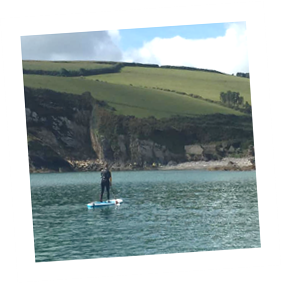
Smartline Research
Wild Wonder & Wisdom
Smartline worked with Wild Wonder & Wisdom founder Kathy King on new ways of evaluating her outdoor programmes.
Wild Wonder & Wisdom (WW&W) empowers young people by reconnecting them with nature, both in the woods and on the water. Kathy King’s Community Interest Company (CIC) provides a valuable opportunity for Cornwall’s kids and young adults from all backgrounds to gain new learning experiences in a different and inspirational setting.
Smartline worked with Kathy to develop new ways of measuring the social impact WW&W has on its participants, many of whom come to the forest school through social support agencies. How can digital technology be involved in innovative new ways of supporting the WW&W experience?
Kathy King tells the story of WW&W.
The background
Outdoor education instructor Kathy launched Wild Wonder & Wisdom in 2019. Her focus is on the emotional literacy skills (self-confidence, self-belief, self-regulation and empathy) as well as the physical benefits of outdoor education. Part of this involves “Momentary Happiness”, a means of tuning into our moods during an activity.
But how do we capture those moods and use them to evaluate the experience? Conventional evaluation isn’t geared up for either the regular Momentary Happiness reflection or the setting (forms and pencils aren’t ideal in the woods). Conventional evaluation also reminds the participants that they are on an intervention programme.
Kathy needed evaluative measures for key reasons:
To enable participants to reflect on learnings, experiences, and impacts on mental health.
To show tangible benefits to social support agencies, to become a go-to provider.
To increase WW&W’s reach by accessing new funding streams.
To enable WW&W to constantly evaluate, innovate and expand their offer.
Kathy decided to approach Smartline for In Residence support to investigate how digital technology be used for data collection.
Photo of someone on Stand up Paddle Board (SUP) as part of the outdoor learning and enrichment programme for young people.
WW&W run bushcraft and camp cooking in the woods for young people, the profits fund similar events and retreats.
The opportunity
How can we measure on-going wellbeing? It’s an interesting question.
On Smartline’s In Residence scheme, Kathy worked with a team led by Dr Tim Walker, who has an interest in digital readiness. Tim is an experienced researcher who works with a range of enterprises supported by Smartline.
Together Tim and the WW&W team worked on three key outcomes:
To improve programme evaluation to increase capacity for tendering opportunities.
To improve emotional literacy through immediate reflection, via new digital technologies.
To identify needs to adapt existing solutions or create a new product or service.
How Smartline helped
The team looked into unobtrusive, wearable and robust tech that would ask mood-related questions throughout the day. Each question would take just seconds to respond to on a touch screen, and wouldn’t impact on the session or require any vocalisation or form-filling. The additional benefit would be that the participant would begin to learn how to reflect on their moods.
Alongside this research, the team worked on two digital infographics about WW&W. This was to create a resource for clearly communicating what WW&W hopes to achieve, with separate infographics for stakeholders and participants.
The stakeholder version focuses on the underpinning theory, evidence and resources required for delivery, while the participant version focuses on the activities and wellbeing outcomes.
Kathy and Tim worked to produce an interview schedule to gather feedback on the new monitoring model and the infographics. They gained feedback from Active Cornwall, Access to Finance, Smart Savings CIC and the WW&W directors. Kathy also had a feedback session with the group of young women who attended her summer Multi-Activity Club.
What were the outcomes?
Dr Tim Walker, the Smartline lead, is enthusiastic about the “great collaboration” Smartline and WW&W developed.
Dr Tim Walker presents research to team of researchers.
“The project was rewarding because we applied research methods to do something tangibly useful for an enterprise.”
There’s been an almost immediate benefit from the communication resource work. WW&W used the infographic as part of their successful application for the National Lottery Community Fund grant, which has enabled WW&W to run a “This Girl Can” after-school club for 11 to 18-year-old girls in the St Austell area.
Emotional literacy and wellbeing is being monitored using Mackerron & Mourato’s (2013) momentary happiness assessment, which links emotion to location at a given moment. The programme schedule has been improved to allow participants to better reflect on their experience and on how green and blue spaces affect their moods.
Research into digital technology for ongoing mood evaluation has shown that there’s nothing suitable available – yet. There’s an existing Momentary Happiness app, but it can’t be adapted for WW&W’s use. The conclusion is that WW&W will need a bespoke version of this in the future.
An additional outcome was that WW&W made useful network connections that can lead to more collaborative work in the future, such as with the designer Charlotte Jones from CRJ Design.
Who is involved?
This Smartline project was funded by the European Regional Development Fund (ERDF). The University of Exeter and Wild Wonder & Wisdom Cornwall worked together to find ways that digital technology could enhance the wellbeing of participants of the outdoor programme.
Smartline leads: Dr Tim Walker, Dr Lewis Elliott and James Rowberry.



